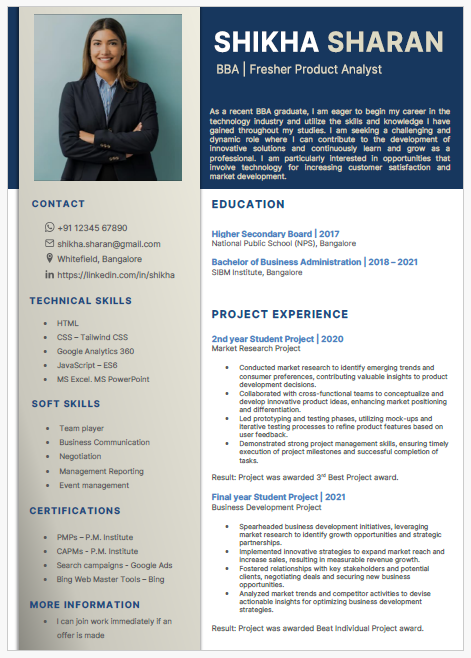Product Analyst Fresher
BBA

About this template
This is a well-designed resume which can make a significant difference in capturing the attention of hiring managers and landing your dream job.
This resume is made by MS Word, featuring a clean and modern layout designed to highlight your skills and achievements.
Some most common and important interview questions for product analyst
When interviewing for a Product Analyst position, candidates can expect a range of questions designed to assess their analytical capabilities, problem-solving skills, and understanding of product management. Here are ten common and important interview questions:
1. Can you describe a time when you used data to solve a complex problem?
This question evaluates the candidate's ability to apply data analysis to real-world challenges. Interviewers are looking for examples of how the candidate identified a problem, analyzed relevant data, and used the findings to implement a solution.
2. How do you prioritize features or tasks in a product roadmap?
This assesses the candidate’s approach to prioritization and understanding of product management processes. Candidates should explain their methods for evaluating feature importance based on user needs, business goals, and resource constraints.
3. What tools and techniques do you use for data analysis and visualization?
This question checks for proficiency in analytical tools and techniques. Candidates should mention tools like Excel, SQL, Tableau, or Google Analytics, and describe how they use these tools to analyze data and create visual reports.
4. How do you handle conflicting feedback from stakeholders?
Interviewers want to understand the candidate’s conflict resolution skills and their approach to balancing diverse opinions. Candidates should discuss strategies for gathering, evaluating, and integrating stakeholder feedback while maintaining a focus on the product’s objectives.
5. Can you provide an example of how you’ve used customer feedback to influence product decisions?
This question assesses the candidate’s ability to incorporate user feedback into product development. Candidates should share examples of how they gathered customer insights and how these insights informed product changes or enhancements.
6. How do you measure the success of a product feature or initiative?
This question evaluates the candidate’s understanding of metrics and performance measurement. Candidates should describe key performance indicators (KPIs) they use to assess feature success, such as user engagement, conversion rates, or revenue impact.
7. Describe a time when you had to analyze a large dataset. What was your approach?
This assesses the candidate’s analytical skills and experience with handling extensive data. Candidates should explain their process for cleaning, analyzing, and interpreting large datasets, and how they derived actionable insights.
8. How do you ensure that your product recommendations are data-driven?
Interviewers are interested in the candidate’s commitment to data-driven decision-making. Candidates should describe their approach to ensuring that their recommendations are supported by robust data analysis and evidence.
9. What is your experience with A/B testing, and how have you used it in previous projects?
This question gauges the candidate’s knowledge of experimental design and testing. Candidates should explain their experience with designing and analyzing A/B tests, and how the results informed product decisions.
10. How do you stay updated with industry trends and emerging technologies?
This assesses the candidate’s commitment to continuous learning and staying current with industry developments. Candidates should discuss methods for staying informed, such as reading industry publications, attending conferences, or participating in professional networks.
Conclusion:
These questions help interviewers evaluate a candidate’s technical expertise, problem-solving abilities, and approach to product analysis and management.